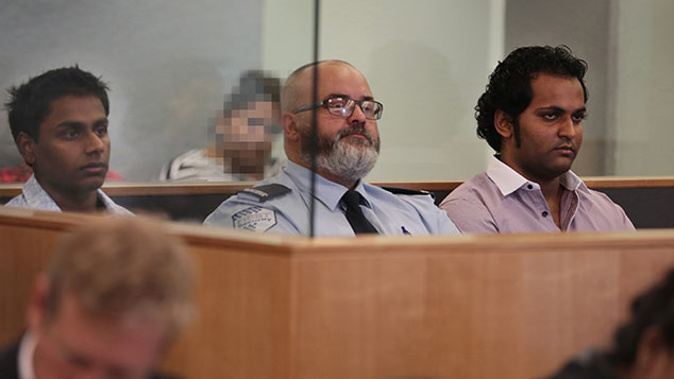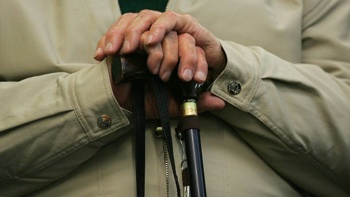
A jury has found Shivneel Kumar and Bryne Permal guilty of the 2013 murder of Shalvin Prasad. The verdict was returned in the Auckland High Court yesterday afternoon, following three days of deliberations.
Mr Prasad's burned remains were found in the early hours of the morning in January that year. It was unclear how he came to be there. Over the weeks which followed more details were revealed which tantalised the public. There was the fact Mr Prasad had withdrawn his life savings - $30,050 - on the last day he was seen alive. There was his missing vehicle and some possessions. Then after a few weeks came the arrest of two associates, Shivneel Kumar and Bryne Permal.
The family was told they'd have to wait a year for a High Court trial, which was set to begin in 2014. A person acting on their behalf relayed their frustration when it was pushed back to this year. It finally began, well over two years after Mr Prasad was killed. It lasted for a month.
Despite the initial case capturing the headlines, the trial ticked away largely out of the mainstream public consciousness. A tropical cyclone, a by-election, a re-trial, a sports tournament have all overshadowed it.
Day after day during their trial the two men in their early 20s sat in the dock, with a security guard between them and another sitting by the door. Permal sat unmoving most days. Seven hours in the same seat, waiting to learn his future. Kumar was the same. Both men with their heads forward, focused on the courtroom. As he walked in on Tuesday before the defence lawyers gave their closing addresses, Kumar gave a small wave to two people in the public gallery.
Every day as he left he caught the eye of relatives and gave a small smile and a wink. When he sat, a muscle in his cheek twitched constantly - is it a sign of nervousness or relaxation? Is he grinding his teeth or is he trying to control his face, keep it blank and not betraying his emotion?
He also beat a little rhythm with his eyelids. Every blink was a double, like a little heartbeat for the trial. Blinkblink. Blinkblink.
Their shirts grew increasingly crinkled as the trial wore on. It's not easy to keep up appearances when you spend each night in a cell.

The Crown's eventually successful case, argued by Aaron Perkins and summed up on Monday, was that the pair set out to commit a murder for money. They pre-planned it and disposed of the body. Text messages and conversations in Kumar's bugged car gave up the game. A plot which wouldn't be out of place on a TV cop drama.
The defence case was split. Kumar's lawyer Ron Mansfield put forward the pair had no intent to kill Mr Prasad - they had all set out to have a fun boy's trip together and something went awry, whether it was a fight or an accident, which left Mr Prasad unconscious or comatose, the pair now thinking he was dead.
Mr Perkins disagreed, saying if Mr Prasad was unconscious as the result of an accident why would the pair buy petrol and destroy evidence rather than seek help?
"[There was] great determination to hide something."
The plot now not so much SVU as a 90s Arnold Schwarzenegger movie about trying to escape a grim misunderstanding.
Kumar's lawyer took a different tack to most. He admits his client is a liar. He says Kumar would "lie at the drop of a hat" if he thought it would prevent him from getting into trouble.
"His default position is to try to get away with it," he told the jury.
They've heard many examples. He said his partner was in hospital in South Africa when trying to leave the country. He told a staff member at a consumer electronics store he'd bought a house in Piha as he splashed out on big budget purchases.
Kumar sits in the dock. Blinkblink, blinkblink. The muscle twitching in his cheek doesn't speed up or slow down. There's nothing to betray any sense of unease at his lawyer essentially damaging his character in open court, a claim which will still be found by any prospective employer on Google even if he is found not guilty. Mr Mansfield pushes it further, saying the pure essence of Kumar's personality as someone who is a liar means it's easier to understand why he would choose to burn the body of a man he thought was dead rather than dialling 111.
"The shocking reality is it's perfectly natural [for him] to see how he could weasel his way out of it."
At the end of it all though he reminds the jury the case comes down to the question - do they believe there's enough evidence to prove the pair planned to murder Mr Prasad, that this wasn't all just a tragic misunderstanding?
Disregard the text messages, he tells the jury. Disregard the chilling question Mr Perkins posed in his closing argument: why, when they bought two canisters of petrol at a service station, did the two men put them in the footwell of the front passenger seat instead of the boot?
"You need to be careful you don't let some sort of sinister undertone creep into the conversations," Mr Mansfield says.
There were confusing twists throughout the trial. Claims Mr Prasad was sitting up or standing when he had petrol poured on him were overruled by a fire expert, who said he had to have been lying on the ground. The defence questions why anyone would lie in one spot and allow petrol to be poured on them, and have the perpetrators back off and set a trail before lighting it on fire if he was conscious.
"It would be funny, if this wasn't a murder trial and that wasn't the Crown case," Permal's lawyer Paul Borich proclaims in his summation. Arnold Schwarzenegger joined by Danny DeVito in a dark comedy.
Tuesday afternoon saw Mr Borich able to outline and sum up his case. He's in a tricky position - because while his client has denied playing a part in the burning of Mr Prasad's body, Kumar's defence relies on it being ambiguous about which of the men carried out the act. But he begins with a flourish, telling the jury this case is not as straight forward as their families and friends may have been telling them, when volunteering their opinions.
He decries what he labels as "the talkback radio juror response" of those who haven't sat in this courtroom for the last month and listened to the hours of police interviews, the volumes of texts, the cross-examinations of a variety of forensic experts.
"Resist the temptation to take the popular, easy route," he pleads.
Mr Borich revisits the police testimony of his client. The interview, as he puts it across, gives a view of Permal as an unwitting and unwilling participant in the act, a man who was used by Kumar to purchase the petrol to cast doubt in his own involvement. He has a go at the forensic experts brought in to the trial. Even gurus can be wrong, he says.
Mr Borich discusses how Mr Prasad's body was dragged to the place it was set alight, re-enacting his theory as he does so.
He again raises the issue of reasonable doubt with the jury. If Mr Prasad's fate was pre-planned by the pair why was his car left in a highly visible place outside his work? Why was the petrol used to burn his body not already purchased?
"Don't allow the tragedy of this death to blind you," he says.
Mr Borich impresses on the 6 men and 6 woman on the jury, a near-perfect cross section of New Zealand life across all ages and ethnicities that if not guilty is the agreed verdict, some may genuinely believe it - while for others it may be a reflection of the lack of evidence of the Crown - but both are ok.
Justice Geoffrey Venning began his final summary on Wednesday morning, giving the jury instruction on their considerations - the presumption of innocence with the onus on the Crown to prove guilt, the issue of reasonable doubt, the accused do not have to prove they are not guilty. They need to treat the trial as two separate cases, not both men together.
One of the jurors stares down the two men as Justice Venning reminds them that on the balance of facts, both men lied during their police testimony at some points. Some of their statements about their movements on the night don't align with CCTV footage. He reminds the jury that the fact neither man took the stand during the trial is not incriminating. He moves on to recap the evidence and testimony they've heard, the fourth person in 48 hours to do so, but the only one to not follow up with an argument about what statements and scene investigations reveal.
A woman sits in the public gallery doing sudoku puzzles.
Justice Venning presents all the different scenarios the jury needs to consider almost as a pick-a-path adventure. If you believe this statement, move on to scenario 3. If you don't, skip to scenario 4.
It took over 25 hours of deliberations across three days for the jury to reach a verdict. In that time they returned to court to ask questions twice. The first time, they huddled around one of the wall-mounted televisions to re-watch CCTV footage of Mr Prasad withdrawing the money, and Permal buying petrol. The second time, a day later, was to ask for a definition of what is meant when applying “beyond reasonable doubt” to reach a verdict.
When the verdict came, it was swift and decisive. Both men were found guilty. Gasps went up from three areas of the public gallery – with relatives of all three men sitting in court. Permal’s relatives burst into tears and swiftly left the courtroom.
One of the jurors sat with tears streaming down her face as Justice Venning told the men they will be remanded in custody until they are sentenced in six weeks. The men sat stoney-faced. Kumar’s twitch stopped. He didn’t look back at his family as he walked out. There was no wink.
After a month-long trial, the jury may have inadvertently picked a day to deliver their verdict which will allow the case to be back in the headlines. There was no cricket. There’s no inclement weather. Mr Prasad’s brother read a statement outside court, telling the difficulty the family has had over the last two years. His parents will have a grandchild in the next few days. People will finally pay attention to their grief, just in time for them to move on.
Take your Radio, Podcasts and Music with you









